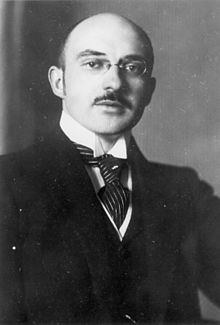- Max Erwin von Scheubner-Richter
-
Ludwig Maximilian Erwin von Scheubner-Richter or Max Scheubner-Richter, born Ludwig Maximilian Erwin Richter (9 January 1884 – 9 November 1923) was an early member of the Nazi party. It was Scheubner-Richter along with Alfred Rosenberg who devised the plan to drive the German government to revolution through the Beer Hall Putsch.
Scheubner-Richter was a Baltic German born in Riga, Livonia and lived a large part of his life in Imperial Russia. During the Russian Revolution of 1905 he belonged to one of the private armies set up to fight against the revolutionaries. He married the daughter of a manufacturer whose factory he had guarded. The 'Scheubner' in his surname was prefixed to his own from his wife's family name: an old German form of having one's lineage ennobled. During the First World War, he served in Ottoman Turkey as the German vice consul of Erzerum. In addition to holding that post, Scheubner-Richter documented the Turkish massacres of Armenians as part of the Armenian Genocide.[1]
After the war he was involved in the Russian counter-revolution. Scheubner-Richter moved to Germany from Russia along with Alfred Rosenberg in 1918. He was the leader of the Aufbau Vereinigung, a conspiratorial organisation, composed of White Russian émigrés and Völkisch minded German National Socialists.[2]
At the end of September 1923, Scheubner-Richter provided Hitler with a lengthy plan for revolution, writing: "The national revolution must not precede the seizure of political power; the seizure of the state's police power constitutes the promise for the national revolution" and "to lay hands on the state police power in a way that is at least outwardly legal".[3]
During the Beer Hall Putsch, walking arm-in-arm with Hitler, he was shot in the lungs and died instantly as Hitler and others marched toward armed guards on 9 November 1923.[4] He had brought Hitler down and dislocated Hitler's shoulder when he fell. He was the only first-tier Nazi leader to die during the Putsch. Of all the early party members who died in the Putsch, Adolf Hitler had claimed Scheubner-Richter to be the only "irreplaceable loss".[5] The first part of Hitler's book "Mein Kampf" is dedicated to Scheubner-Richter and the other fifteen men who died in the Putsch.
References
- ^ Akcam, Taner. A Shameful Act: The Armenian Genocide and the Question of Turkish Responsibility. New York: Metropolitan, 2006 pp. 121, 156, 158 ISBN 0-8050-8665-X
- ^ Michael Kellogg. The Russian Roots of Nazism White Émigrés and the Making of National Socialism, 1917–1945 - Cambridge 2005
- ^ Heiden, Konrad. Der Fuehrer: Hitler's Rise to Power. New York: Houghton Mifflin Co, 1944 p. 184
- ^ Toland, John. Adolf Hitler: The Definitive Biography. New York: Anchor Books, 1976 p. 170 ISBN 0-3854-2053-6
- ^ Balakian, Peter. The Burning Tigris: The Armenian Genocide and America's Response. New York, HarperCollins, 2003 p. 407 ISBN 0-0605-5870-9
External links
Categories:- 1884 births
- 1923 deaths
- Baltic-German people
- Nazi leaders
- People from Riga
- People from Livonia
- Witnesses of the Armenian Genocide
- Nazi martyrs
Wikimedia Foundation. 2010.

